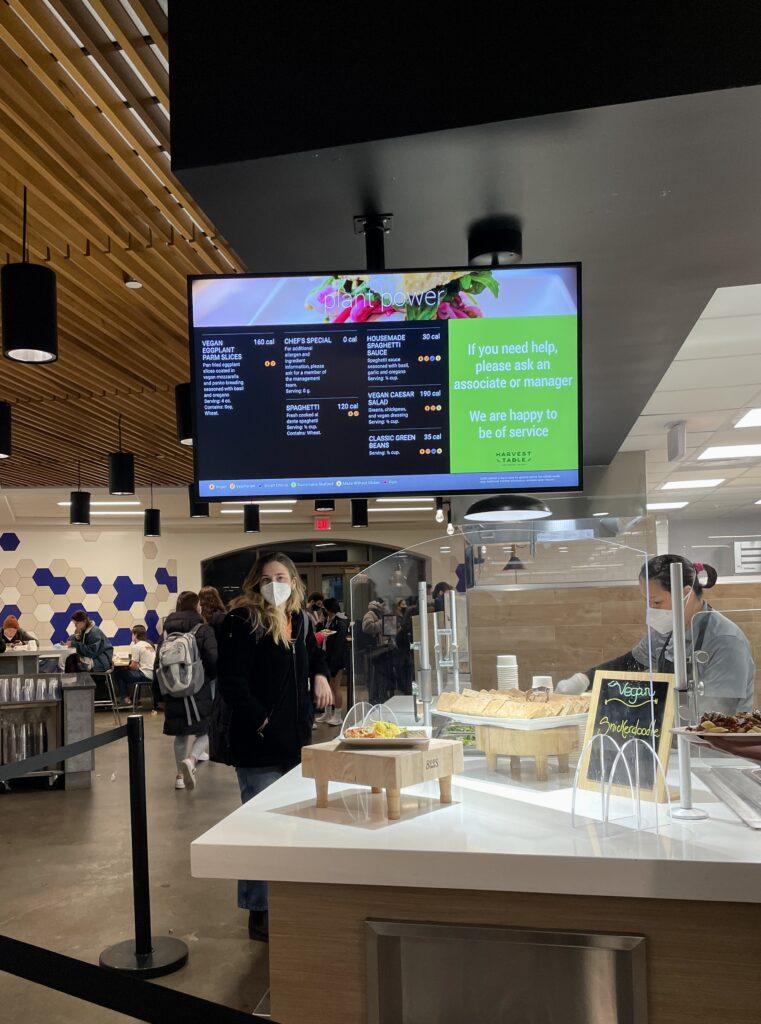Multiple items at Leo J. O’Donovan Dining Hall, Georgetown University’s main dining location, are inaccurately labeled or fail to comply with dietary restrictions.
Students noticed that Hoya Hospitality frequently labels food items as vegan in the downstairs portion of Leo’s despite the ingredient lists including milk or eggs, and fails to ensure vegetarian meals do not include meat products, according to multiple student testimonials.
Sam Dorsey (COL ’22) received mislabeled items from Leo’s on multiple occasions over the past few months, including a brioche burger bun that was labeled as vegan but actually contained milk and eggs and “vegan” pita bread that contained buttermilk and clarified butter.
“I had stomach problems for more than a month because of this — I tried varying my diet and taking supplements, but I couldn’t figure out what the issue was until I saw an employee at Leo’s opening a package of the naan,” Dorsey wrote in an email to The Hoya. “I recognized the brand, since it’s one that my parents buy, and I realized that I had been feeling sick for so long because the hummus bar was not vegan.”
Dorsey said the mislabeling could pose severe health risks like anaphylaxis, a life-threatening allergic reaction, if meals were incorrectly labeled as allergen-free.

“Mislabelling allergen-containing food displays a reckless disregard for the safety of students with food allergies,” Dorsey wrote. “Leo’s has displayed little to no respect for folks with special dietary needs or preferences.”
The university is aware of some inconsistencies between menu labels and food being offered, according to a Hoya Hospitality spokesperson.
“Recently, Hoya Hospitality was made aware of menu items on stations outside of the allergen-free station that were not properly reflected on menu boards and the website, and addressed these issues immediately,” the spokesperson wrote in an email to The Hoya. “These incidents did not occur at the allergen-free station.”
Julia Skeen (COL ’22) ate a curry and noodle dish that was advertised as vegan for her entire first semester in 2018 before finding out that the sauces contained fish.
“When I reached out to the University, they basically told me to stop eating anything with the sauce and just eat plain rice and tofu,” Skeen wrote in an email to The Hoya. “In my sophomore year, there were two instances in which I ate a dish that was advertised as vegan but had cheese in it, which has the potential to make me really sick.”
Skeen said that the frequent mislabeling of food at Leo’s, which has occurred for years, takes both a physical and mental toll on her.
“Since I’ve been vegan for 6 years, eating animal products can and has made me physically ill,” Skeen wrote. “It’s also really frustrating and emotionally exhausting to not be able to trust that the food I’m eating is safe for me.”
Gwyneth Murphy (SFS ’23) is vegan and was served regular crab cakes instead of vegan ones.
“I would’ve eaten them without knowing and gotten incredibly sick since I’ve never had seafood before and it’s been 14 years since I’ve had meat, but luckily another worker saw the mistake happen and chased me down right before I walked out of Leo’s to let me know what had happened and to tell me to throw it out,” Murphy wrote in an email to The Hoya. “But that kind of situation, as much as a crab cake seems like a small risk, can turn into a major liability when long-term vegans consume meat that gets them hospitalized.”
Murphy has medical dietary restrictions, but Georgetown rejected her request for an exemption from the meal plan.
“Despite my doctor asking Georgetown to exempt me from the meal plan, the university put financial needs above student wellness and refused to offer an exemption,” Murphy wrote. “Now I pay thousands of dollars per semester for a meal plan that I’ve only used twice in the last seven months, once to get a cup of lemonade and once to get a to-go container of broccoli.”
Exemptions are not considered for those who are voluntarily on a vegan, vegetarian or gluten-free diet.
The university’s strict meal plan policies and limited offerings for students with dietary restrictions force students to choose between their beliefs and their health, according to Dorsey.
“No matter why a person chooses their particular diet, they have a right to eat what they want and control what goes into their bodies,” Dorsey wrote. “Attending Georgetown means gambling your health on a shockingly expensive meal plan that does little to feed you.”




















